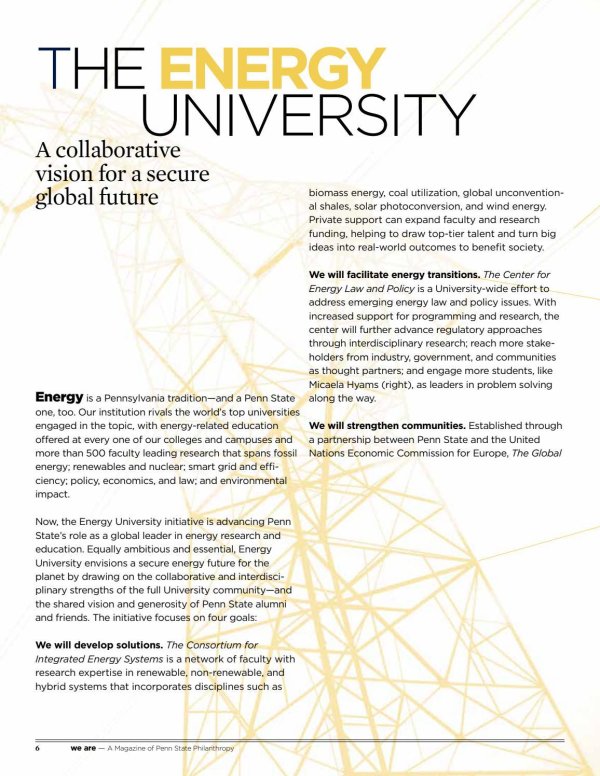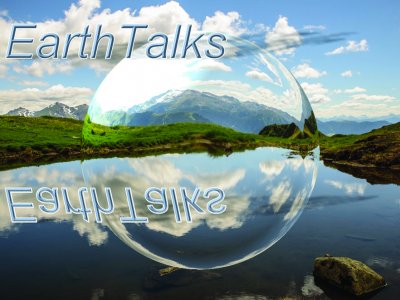Energy is a Pennsylvania tradition and a Penn State one, too. Our institution rivals the world's top universities engaged in the topic, with energy-related education offered at every one of our colleges and campuses and more than 500 faculty leading research that spans fossil energy; renewables and nuclear; smart grid and efficiency; policy, economics, and law; and environmental impact.
Now, the Energy University initiative is advancing Penn State's role as a global leader in energy research and education. Equally ambitious and essential, Energy University envisions a secure energy future for the planet by drawing on the collaborative and interdisciplinary strengths of the full University community and the shared vision and generosity of Penn State alumni and friends. The initiative focuses on four goals:
- We will develop solutions.
The Consortium for Integrated Energy Systems is a network of faculty with research expertise in renewable, non-renewable, and hybrid systems that incorporates disciplines such as biomass energy, coal utilization, global unconventional shales, solar photoconversion, and wind energy. Private support can expand faculty and research funding, helping to draw top-tier talent and turn big ideas into real-world outcomes to benefit society. - We will facilitate energy transitions.
The Center for Energy Law and Policy is a University-wide effort to address emerging energy law and policy issues. With increased support for programming and research, the center will further advance regulatory approaches through interdisciplinary research; reach more stakeholders from industry, government, and communities as thought partners; and engage more students as leaders in problem solving along the way. - We will strengthen communities.
Established through a partnership between Penn State and the United Nations Economic Commission for Europe, The Global Building Network focuses on construction and facilities management, with goals to lower greenhouse gas emissions, improve indoor air quality, and expand manufacturing for regional economic growth. Donor investment can help to train additional scholars and regional leaders in community outreach efforts. - We will advance literacy and leadership.
With the nonprofit organization Project Drawdown, Penn State has launched the Drawdown Scholars Research Experiences for Undergraduates Program. This free, ten-week summer program is aimed at all undergraduate students, but especially those from underserved populations, many of whom have limited financial means. With philanthropic support, Penn State can prepare a new generation of leaders to address complex global climate issues at local and regional scales.
Penn State Student: Micaela Hyams
Our institution rivals the world’s top universities engaged in the topic, with energy-related education offered at every one of our colleges and campuses and more than 500 faculty leading research that spans fossil energy; renewables and nuclear; smart grid and efficiency; policy, economics, and law; and environmental impact. Now, the Energy University initiative is advancing Penn State’s role as a global leader in energy research and education—and engaging future leaders like Micaela Hyams.
With a background in environmental conservation, biology, education, and political science, Micaela is pursuing a J.D. at Penn State Law, a governing member of the Center for Energy Law and Policy. The 2020–21 president of Penn State Law’s Environmental Law Society, Micaela received a Public Interest Law Fund Fellowship in 2020 and aspires to work at the intersection of environmental law, energy, and infrastructure.
What led you to choose Penn State Law?
First, it was the Penn State community—this village of professors and professionals who are so committed to students. I also chose Penn State because I knew that I wouldn’t be in an echo chamber. I wanted to hear and engage with many perspectives on the environment and energy and policy.
How do we make progress amid differing perspectives?
Progress comes from exploring the “why” behind differing opinions. For example, you can’t be a good attorney if you’re unwilling to read the other side’s briefs. You have to sit with the argument and the logic. We have to try to understand what makes us uncomfortable or we do a disservice to the possibilities of moving forward.
What does the future of the energy sector look like to you?
We have an opportunity to address the pressure points of today’s energy sector with an intentional approach attuned to social and environmental justice and to the ecological benefits we could reap. I’m thinking about how we can be sure that the people with the most to lose and gain are represented and/or advocated for throughout the transition.
How can Penn State supporters play a role?
By continuing to foster opportunities for engagement. A school like Penn State—one with a diverse scholarly mindset that is so rich in interdisciplinary work—is a pretty incredible space to be in at this moment.
From the fall 2021 issue of We Are magazine.




